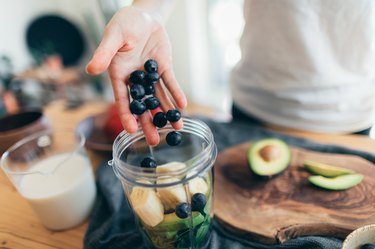
Paying attention to your sugar intake is a smart move when you're trying to lose weight. But getting added sugar right isn't always easy, and some of the strategies you think might be helpful could actually make it harder to reach your goals.
Here, nutrition experts share where you might be going wrong with the sweet stuff — and how to strike a healthy balance that will work in the long run.
Video of the Day
Video of the Day
Myth 1: You Have to Swear Off Sugar Completely
Cutting out sweets altogether might help you reduce your calorie intake and lose weight in the short-term. But that approach can lead to feeling deprived, and it can ultimately end up backfiring.
"You'll likely find yourself thinking about sugar way more than you ever did before and eventually overeating it," says Jamie Nadeau, RDN, founder of The Balanced Nutritionist.
Not only can that thwart your weight-loss progress, it can also cause you to feel guilty and think about giving up on your healthier eating goals altogether.
What to do instead: It's OK to eat sugar and sweet foods, just have them in moderation. "No one's denying that it's healthier to be more mindful of sugar intake, but there's a balance to be found," Nadeau says.
You're more likely to keep your cravings — and overall calorie intake — in check by having a cookie or a piece of chocolate after dinner each night than splurging on, say, an entire carton of ice cream after saying no to sugar all week.
Myth 2: You Should Avoid the Sugar in Fruit and Dairy
Yes, fruit and dairy foods like milk and unsweetened yogurt contain naturally occurring sugars (namely, fructose and lactose). But there's no need to avoid these foods, experts say, because they come packaged with good-for-you nutrients.
"Milk has protein and calcium, while a piece of fruit has vitamins, minerals and fiber. These provide benefits that outweigh the sugar," says Jacquelyn Bucci, RD, Outpatient Registered Dietitian at Bridgeport Hospital.
On the other hand? Added sugars, like the table sugar in a cupcake or sweetened coffee drink, don't offer any nutritional benefits.
What to do instead: A healthy diet includes a variety of whole, minimally processed foods. That includes fruit and dairy, so there's no need to limit your intake when you're trying to cut back on sugar, per the American Heart Association.
Just remember that, if you're trying to lose weight, you should be mindful of your calorie consumption overall, Bucci says. "Recommendations for a 2,000-calorie-per-day diet are two to three servings of fruit and three servings of dairy products [per day]," she notes.
Myth 3: Honey and Maple Syrup Are Better Because They're Natural
Natural sweeteners like honey, maple syrup, agave nectar or coconut sugar are less processed than table sugar, but that doesn't make them better for you. In fact, all of these sweeteners contain the same amount of calories, and your body processes them in the same exact way, according to the Mayo Clinic.
Baking with honey or stirring coconut sugar into your coffee still contributes added sugar to your diet, Bucci says, and having too much can make it harder to lose weight.
What to do instead: Foods made with natural sweeteners contain the same amount of added sugars — and calories — as those made with more processed sweeteners. So aim to treat honey, maple syrup and other natural sweeteners exactly like table sugar.
"When it comes to weight loss, what matters most is being mindful of added sugars and how much you're adding, because they're a source of extra calories with not much else nutritionally," Nadeau says.
Myth 4: You Should Swap Out Sugar for Low- or No-Calorie Sweeteners
Low- or no-calorie sweeteners like stevia, sucralose or aspartame may help you trim your total calorie intake, and in turn, support your weight-loss efforts. But the long-term benefits aren't conclusive, Bucci notes, and some of the sweeteners could potentially have negative effects. You might end up replacing the calories with something else ("I'm having diet soda, so I'll get the fries with my burger!") or find yourself craving even more sweet foods, according to Harvard Health Publishing. And both of those things could affect your weight negatively over time.
What to do instead: There's likely little harm in having a diet soda now and then. But you shouldn't rely on low- or no-calorie sweeteners to lose weight.
"Several credible nutrition resources such as the Dietary Guidelines for Americans, American Heart Association and American Diabetes Association do not recommend swapping caloric intake of added sugars with non-nutritive sweeteners, but rather choosing more healthful options overall," Bucci says. "As with most of this discussion regarding sugar and health, it appears that less is best."
Myth 5: You Can Just Ignore the Sugar in Non-Dessert Foods
You know that a donut or a slice of cake is packed with sugar. But plenty of packaged foods that fall outside of the realm of dessert (like breakfast cereals, flavored yogurts, condiments and even bread) have added sugar too, according to Johns Hopkins Medicine. And ignoring those could mean you're taking in way more added sugar than you think.
What to do instead: Always read the nutrition facts label to see how much added sugar a food contains. "A good rule of thumb is the closer to 0 percent of your daily value of added sugars the better, with anything over 5 percent as being high in added sugars," Bucci says. "Trying to be mindful of your food choices in general and choosing more natural or non-processed foods as much as possible can help prevent going overboard with sugar."
Was this article helpful?
150 Characters Max
0/150
Thank you for sharing!
Thank you for your feedback!